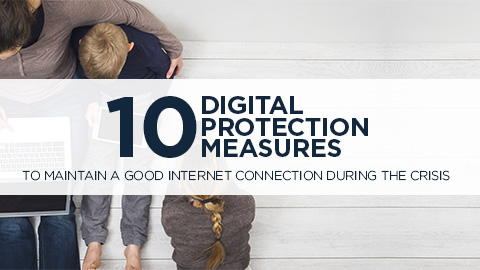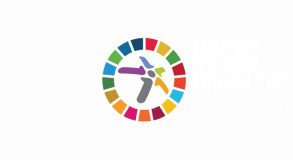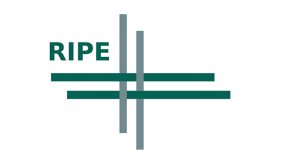
During the epidemic and lockdown, access to the Internet will be more essential than ever for all kinds of professionals, notably for researchers, doctors and carers but also for the many people now working from home, students, schoolchildren, etc. There are certain digital protection measures we must implement in order to prevent service interruption, reductions in speed and communication-related difficulties and therefore meet all of their needs, from the most essential of remote medical care and working from home to more secondary, but no less important, leisure and streaming facilities.
- Disable data on your smartphone wherever possible when working on your computer (keeping only the voice functions active); those working from home in front of their computers already have access to just about everything they might need on their smartphones.
- Turn off tablets and TV boxes when not in use.
- Listen to the radio in FM mode rather than over the Internet.
- Download heavy files, films and video games at night.
- Do not download in ultra HD – a film in standard DVD format weighs around 2 gigabytes as opposed to 100 GB for a film in ultra HD, and the majority of screens are not adapted to display the latter anyway.
- Update your anti-virus software and check that the security patches of the trusted software publishers you use are properly installed to avoid security flaws that could be detrimental to the entire business network to which you are connecting remotely.
- Configure your emails to display in plain text format to prevent the risk of clicking on a malicious URL.
- If you have the choice, opt for a fixed connection through a router rather than a 4G connection when connecting to the Internet.
- Set the speed of your favourite streaming site at least one notch lower.
- Do not routinely ‘reply to all’ unless absolutely necessary to avoid overloading servers.
These basic measures are not only useful in times of crisis, but at any time. Given the current situation, however, everyone can make a difference by taking a moderate approach to using digital tools. This will help prevent reductions in speed, congestion and the exploitation of security loopholes and allow everyone to continue to use digital tools comfortably. Furthermore, these measures have a medium-term impact on the energy that digital technology uses. Adopting and mastering these habits will also help control the environmental impact of our digital practices.
About Afnic
Afnic is the acronym for Association Française pour le Nommage Internet en Coopération, the French Network Information Centre. The registry has been appointed by the French government to manage domain names under the .fr Top Level Domain. Afnic also manages the .re (Reunion Island), .pm (Saint-Pierre and Miquelon), .tf (French Southern and Antarctic Territories), .wf (Wallis and Futuna) and .yt (Mayotte) French Overseas TLDs.
In addition to managing French TLDs, Afnic’s role is part of a wider public interest mission, which is to contribute on a daily basis, thanks to the efforts of its teams and its members, to a secure and stable internet, open to innovation and in which the French internet community plays a leading role. As part of that mission, Afnic, a non-profit organization, has committed to devoting 11% of its Revenues from managing .fr Top Level Domain to actions of general interest, in particular by transferring €1.3 million each year to the Afnic Foundation for Digital Solidarity.
Afnic is also the back-end registry for the companies as well as local and regional authorities that have chosen to have their own TLD, such as .paris, .bzh, .alsace, .corsica, .mma, .ovh, .leclerc and .sncf.
Established in 1997 and based in Saint-Quentin-en-Yvelines, Afnic currently has nearly 90 employees.




